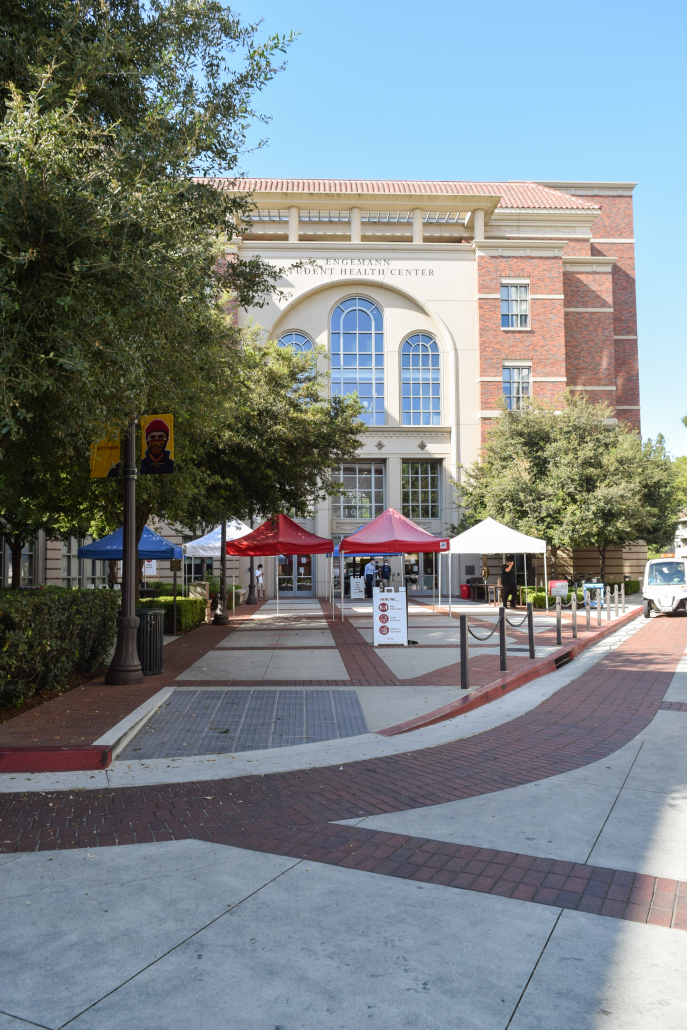Demand for mental health services rises

When Hailey Irwin was a freshman in 2019, she sought out mental health services at USC. USC Student Health told her that in order to get weekly services, she would have to enter into a lottery system and that she should look for off-campus help. Because Irwin did not have her own transportation, she decided to hold off until the following year.
Throughout the coronavirus pandemic, the University increased its mental health services by recruiting 50 new faculty members in 2020 and broadening the types of counseling services offered. According to the Counseling and Mental Health website, USC offers individual therapy, group therapy, crisis support, psychiatric services and specialties for gender-based harm.
The demand for mental health services since the beginning of the coronavirus pandemic in March 2020 increased throughout the nation as well. The New York Times wrote that nine out of 10 therapists surveyed said there is a rise in the number of clients seeking help, and that most of the 1,320 therapists surveyed said they experienced difficulty meeting patient demands.
In a Feb. 1 health briefing, Chief Health Officer Dr. Sarah Van Orman said she and her colleagues saw a rise in students seeking services over the course of the coronavirus pandemic. She said that, in turn, the University increased counseling and mental health staff.
“We do know a number of students who do struggle with the requirements for isolation, so we try to support those students as well. That’s difficult,” Van Orman said. “As we’re coming out of it, I think people have the lingering effects of that, particularly this last wave that I think caught people by surprise.”
Irwin, a junior majoring in geodesign, said she found the University improved its services since she first sought them out, especially throughout the pandemic.
“Freshman year was a lot more challenging because it was all in-person. There was no COVID, and they didn’t have the required staff to do it,” Irwin said. “My sophomore year, when I sought out help, it was a lot easier to get a daily or weekly person just because there was not the demand.”
During the 2020-2021 school year, the University’s mental health services were only accessible to people living in California because all appointments were virtual. Irwin received help during this time as a California resident and said she believes the services met her demand.
Sophia Hilsabeck, a senior majoring in public policy, began using USC’s mental health services a year ago. She said her experience using the services was a positive one, and she felt lucky with the therapist she received.
For individual therapy, students can sign up for a limited number of sessions with a counselor, after which Student Health assists them in finding a therapist that takes the students’ insurance.
Hilsabeck began therapy sessions in Spring 2021, but decided to take a break at the end of the semester once her free sessions were over. Hilsabeck said her therapist told her if she wanted to return to therapy in future semesters, she could send a message through MySHR to a therapist for short-term treatment.
Hilsabeck said Student Health gave her a list of therapists to contact who related to what she was looking for under her insurance. She said finding the right off-campus therapist was a “daunting” task.
“I wanted ideally a person of color or one of the women, so [Student Health] kind of took that into account, took my insurance into account, my location and then, they gave me a list of maybe six or so either people or groups to reach out to, so I had to reach out on my own, and then you’re kind of stressed,” Hilsabeck said.
When scheduling her initial appointment, Anne Whelan, a sophomore majoring in computer science and physics, found the Student Health website to be confusing. She recently began using the University’s mental health services and said it has been a positive experience so far. However, she said she would have started using the services earlier had she been able to navigate the website.
“They don’t really list out the appointments, so it was kind of difficult in that sense, it’s not immediate. You do have to call the number instead, which it was honestly fine,” Whelan said. “It was very simple scheduling an appointment, but you don’t really get to choose whoever; they just give one for you.”
Though he had a positive experience with USC’s mental health services, Robert Scalia, a senior majoring in international relations, said there are not enough student resources related to sexual assault.
“If someone’s been sexually assaulted, it’s not enough to just have mental health services. There also needs to be something like rape kits on campus or some sort of rape trauma center on campus,” Scalia said. “I think that their mental health has been accessible for me, but I think that they’re lacking other resources to support that mental health work.”
Scalia also said there should be more advertising for Student Health services, especially in classrooms. Most professors include resources that are offered through the University at the end of syllabi, but Scalia said he believes it would be beneficial for professors to discuss those resources in-depth.
Despite these difficulties, Hilsabeck is “grateful” for her experience with the University’s mental health services, and said she would have stayed if not for the session limit.
“It takes two or three weeks to find someone,” Hilsabeck said. “By the time you get to know them, they’re like, ‘Okay it’s time to move on.’ That part is kind of hard.”

